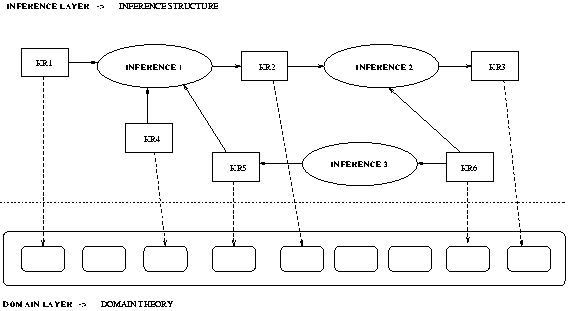


Next: Inference Structure for
Up: KADS CONCEPTUAL MODEL
Previous: KADS CONCEPTUAL MODEL
The inference layer describes the primitive inferences of a PSM
through the inference structure. The inference structure is a diagram
that shows the conceptual interconnection of the inferences by means of the
knowledge roles. Rectangles represent knowledge roles, ovals represent
inference actions and arrows are used to indicate input-output
knowledge roles dependencies. The inference structure does not specify
the control flow among the inferences, which is defined in the task
layer. Figure 2 illustrates a generic
schema for
the inference structure.

Figure 2: A generic inference structure (adapted from
(Aben, 1995)). Labels indicate what the inference
accomplishes. The knowledge roles labels are placeholders for
the domain knowledge. In this representation, the structure of
knowledge is defined in the domain layer, which contains a
theory that establishes the inherent organization of the
concepts and relations of a domain. The basic idea is that
the knowledge roles can be instantiated with different domain
knowledge.
The problem with this description is that the labels that specify the
knowledge roles are abstract and do not clarify how is their inherent
structure. The structure of the knowledge is described only in the
domain layer. However, the domain layer represents a structure of a
particular domain, that may not corresponds to the structure of the
knowledge used by the inferences. We argue that also a theory about
the knowledge roles is needed to make explicit their structure. In
section 3, we construct a method ontology, which
constitutes a theory about the organization of the knowledge used by a
method.
Eliana Coelho
Wed Sep 4 15:57:17 EDT 1996
